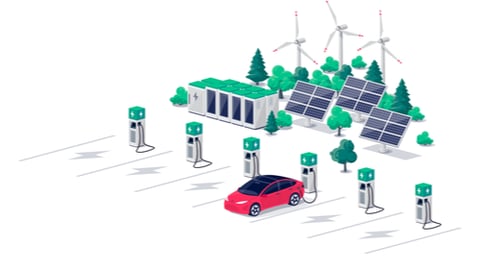Going for green at the pump
Amid a dynamic landscape characterized by rising and falling fuel prices, policies like the federal government’s Net-Zero Emissions Accountability Act that aims to reach the elusive mark of net-zero emission by 2050, it’s no surprise that Canada’s transportation industry has begun adopting ways to make our roads greener. The recent “Embracing Canada’s Low-Carbon On-Road Transportation Opportunity” study, published by the Canadian Transportation Alliance, found that demand for hydrogen is projected to grow five times by 2050, while 10 to 12% of light-duty vehicles on our roads are expected to be electric by 2030. With those changes, individual consumers are also considering ways to make their spending habits, fuel choices and buying decisions a little greener.
[Read more: "Transport industry should embrace multiple pathways to reach net-zero 2050: CTA"]
According to the EY Future Consumer Index Survey, 69% of Canadian consumers expect companies to solve sustainability issues and our very own 2023 C-store IQ National Shopper Study—the only research that delves into the minds of c-gas customers in Canada—shows that 74% indicate some likelihood to switch c-stores based on sustainability practices.
In other words, your c-gas have high expectations, and they expect you to act. With that in mind, we asked industry experts about the latest innovations designed to help make your forecourt eco-friendlier.
All in on recycling
North York, Ont.-based Gorrie has been a leader in recycled products for the forecourt for over 40 years. On its recycling and commercial products side (Gorrie RCP), the company manufactures products made from low-density polyethylene plastic and recycled plastic.
Steffen Schenk, co-CEO of Gorrie says that its own range of products, including merchandising displays, signage, waste bins, fixtures and more can be recycled. As well, its recently launched multi-stream products feature waste bins that help operators categorize waste into one, two, three or four streams depending on the waste and recycling policies in their municipality.
Rather than just a basic garbage bin, the products illustrate to forecourt and convenience customers that operators are committed to environmental initiatives that reduce the amount of waste in landfills.
Communicate efforts
Schenk says it’s important for operators to demonstrate to their customers that they want to make a difference. The first step, according to him, is by demonstrating that they adhere to the principles of “reduce, reuse and recycle”: “There should be signage right at the pump that explains what the corporate office is doing to promote a lower carbon footprint and how it is achieving the green initiative,” says Schenk, adding sustainability and care go far beyond the pumps, and operators should assess their entire site to put their beliefs into action.
“From washrooms to the amenity units at the pump island, ‘clean’ means that management is conscious to provide a safe and clean environment,” adds Schenk
Reduce plastic
Ontario-based EcoTank’s offering includes an eco-friendly solution for refilling windshield washer fluid. EcoTank produces and installs completely autonomous tanks for customers to refill their windshield washer fluid.
“Our solution is completely attendant-less. We install the equipment and manage the entire process including service and refill,” says Robbie Mair, co-founder and CEO of EcoTank Canada. “This way operators don’t need to worry about the handling, garbage disposal, labour and loss of inventory costs associated with typical plastic jug sales.”
So far, EcoTank has installed more than 1,100 units across 19 countries. Its tanks eliminate the need for plastic jugs of windshield washer fluid and helps track carbon and plastic credits through EcoTank’s software.
Mair says that standard windshield washer fluid jugs are “contaminated with methanol, so without an expensive and thorough cleaning process, are not recycled properly and so mostly end up in landfills.”
Arctic Blue president, Tom White, who set out to promote environmental concerns and eliminate plastic waste by inventing Easy Flow On Tap, agrees. He says his solar-powered mini bulk vending dispensing system for windshield washer fluid and air inflator services “eliminates two skids, 104 cardboard cartons and 416 jugs from the environment with each refill.”
[Read more: "Arctic Blue and P.D. McLaren partner on sustainable development"]
A testimonial from one female customer reinforces that c-gas customers are looking for sustainability innovations to support their personal values: “I truly believe this should be mandatory for all gas stations so we can all do our part eliminating plastic and bettering the world for our children and theirs.”
Tackle spillage
Ohio-based Red Leonard Associates represents multiple manufacturers in North America’s forecourt industry. Jim Rodd, sales manager at Red Leonard says that many of the company’s manufacturers have been working on eco-friendly solutions for the forecourt. One of its brands, Husky, recently introduced a new line of eco-friendly nozzles.
Robb explains that “The nozzle is equipped with a mechanical interlock designed to shut off fuel flow before the spout is out of the tank. The design will significantly reduce customer top-off spills.”
Envision the future
As for the future of the forecourt, the experts note several innovations that excite them.
“We see a trend to other sustainable products including solar panels on canopies, electric vehicle (EV) chargers and even solar windmills to help support offsets,” says Mair.
Schenk agrees: “The most obvious eco-friendly trend in the industry is the growth in the electric-car market, which certainly reduces the amount of petroleum used.”
[Read more: "Fuelling the future"]
Canada’s big players are working steadily to expand their network of charging stations, however there are plenty of more immediate steps that operators of all sizes can take now to showcase their commitment to sustainability.
[Read more: "The fuel station of the future: Is it time to add EV-charging to your offering?"]
Investing in recyclable merchandisers, refillable windshield washer fluid tanks and nozzles that can reduce gas spillage are practical solutions to make your forecourt more eco-friendly.












